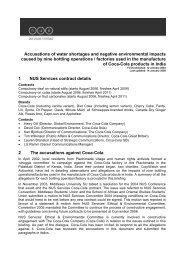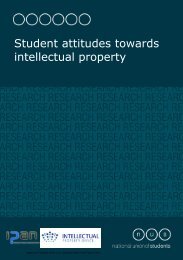Review of Institutional Complaints and Appeals Procedures in ...
Review of Institutional Complaints and Appeals Procedures in ...
Review of Institutional Complaints and Appeals Procedures in ...
You also want an ePaper? Increase the reach of your titles
YUMPU automatically turns print PDFs into web optimized ePapers that Google loves.
<strong>and</strong> so explanation <strong>of</strong> the next stage is much more likely, as there is no issue <strong>of</strong> staff conflict<br />
<strong>of</strong> <strong>in</strong>terest.<br />
Monitor<strong>in</strong>g the <strong>in</strong>formal stages<br />
It was commented that it was <strong>of</strong>ten very difficult to monitor the number <strong>of</strong> compla<strong>in</strong>ts at the<br />
<strong>in</strong>formal stages, with <strong>in</strong>formal compla<strong>in</strong>ts not be<strong>in</strong>g centrally reported. This means it is difficult<br />
to get a picture <strong>of</strong> what students are compla<strong>in</strong><strong>in</strong>g about at the local level <strong>and</strong> whether there<br />
are any trends across the <strong>in</strong>stitution. It is therefore important to ensure that records are kept<br />
<strong>of</strong> the number <strong>and</strong> type <strong>of</strong> compla<strong>in</strong>t/appeal, even at the <strong>in</strong>formal stage.<br />
We should however make the differentiation between the <strong>in</strong>formal <strong>in</strong>formal processes <strong>and</strong> the<br />
formal <strong>in</strong>formal processes. We are not suggest<strong>in</strong>g that the <strong>in</strong>formal <strong>in</strong>formal compla<strong>in</strong>ts, such<br />
as a student compla<strong>in</strong><strong>in</strong>g about a lecturer turn<strong>in</strong>g up late once or the heat<strong>in</strong>g not work<strong>in</strong>g <strong>in</strong> a<br />
lecture theatre, should be recorded with<strong>in</strong> these <strong>of</strong>ficial statistics for compla<strong>in</strong>ts that are<br />
reported to the govern<strong>in</strong>g body – although it would be useful for the department to keep track<br />
<strong>of</strong> these. These k<strong>in</strong>d <strong>of</strong> <strong>in</strong>formal compla<strong>in</strong>ts should be dealt with mechanisms such as the<br />
staff/student liaison committee. It is where there are more serious compla<strong>in</strong>ts that are dealt<br />
with <strong>in</strong>formally that they should be recorded.<br />
It is therefore key that there is greater clarity both with<strong>in</strong> <strong>in</strong>stitutions, <strong>and</strong> also across the<br />
sector, about what compla<strong>in</strong>ts should be recorded <strong>and</strong> to whom they should be reported.<br />
Mediation<br />
It is also important to identify what we mean by “<strong>in</strong>formal procedures” <strong>and</strong> how formal the<br />
<strong>in</strong>formal mechanisms are. The case study above looks at the role <strong>of</strong> campus ombudsman,<br />
another key <strong>in</strong>formal mechanism is mediation.<br />
Mediation is an <strong>in</strong>formal, voluntary, <strong>and</strong> consensual process <strong>in</strong> which disput<strong>in</strong>g parties work<br />
with an impartial mediator to resolve their differences. Both parties must agree to participate<br />
<strong>in</strong> the mediation. Mediation can be quicker <strong>and</strong> less bureaucratic <strong>and</strong> more “user-friendly” <strong>and</strong><br />
resolved to the satisfaction <strong>of</strong> both parties. It will however be important to ensure that both<br />
sides believe that the mediation is truly <strong>in</strong>dependent <strong>and</strong> impartial.<br />
It is likely that greater use <strong>of</strong> mediation <strong>in</strong> student compla<strong>in</strong>ts would result <strong>in</strong> better outcomes<br />
for both parties. It may not work <strong>in</strong> every case where relations between <strong>in</strong>dividuals have<br />
broken down irrevocably but would be a good start<strong>in</strong>g po<strong>in</strong>t <strong>in</strong> most cases. Although, it can<br />
also mend broken relations <strong>in</strong> some cases.<br />
18

















